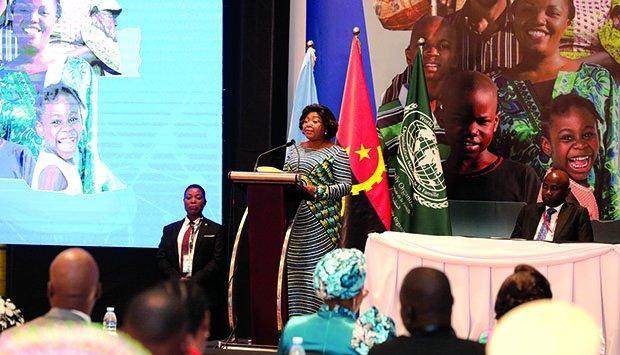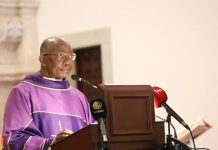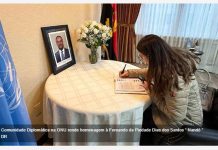Africa-Press – Angola. The Vice-President of the Republic, Esperança da Costa, asked for more reflection on the problems that affect families and collection of contributions for the realignment of public policies and appropriate programs, aiming at harmony and strengthening family cohesion and moral and civic values , cultural and patriotic.
Esperança da Costa, who spoke at the opening of the 25th Session of the National Family Council, said that the event reflects on the urgent need to make concerted efforts so that the family continues to be the “present and future of societies, as a central nucleus for the achievement and preservation of peace, harmony, responsibility, solidarity and sustainability”.
On the occasion, he emphasized the fact that the Angolan Executive, in alignment with the United Nations 2030 Agenda and the Africa 2063 Agenda, “Africa we Want”, identifies the Social Action and Family Valorization program.
The meeting, which takes place under the motto “Investing in Families and Achieving the Targets of the Sustainable Development Objectives”, Esperança da Costa argued that the family is, without a doubt, the most important institution in any society and the first space for socialization where one learns to live together, to respect rules and to develop feelings, such as affection, love for others and respect for the rights of others.
For Esperança da Costa, this meeting takes place at a time when several negative externalities have an atrocious impact on family stability.
“Global geopolitical tensions, taking into account the conflicts in Africa, the wars in Europe, in the Middle East in all their dimensions, the extreme events resulting from climate change, produce alarming cascading effects for a world economy already weakened by the effects of Covid-19, which has forced us to review strategies, in order to guarantee food security and reduce poverty”, he highlighted.
“The family is the object of special protection”
The Vice-President of the Republic, Esperança da Costa, highlighted, at the 25th Session of the National Family Council, the “Kwenda” Social Protection Strengthening Program as one of the Executive’s projects that aims to restore dignity to families, with a basis of data from four million people in different vulnerable situations.
According to Esperança da Costa, the program, which aims to strengthen the capacity of the social protection sector to implement short and medium-term poverty alleviation measures, with monetary transfers to families, has already covered populations in 94 municipalities, 328 communes and 15,375 villages from the country.
When speaking at the opening of the event, attended by the First Lady of the Republic, Ana Dias Lourenço, by the president of the World Family Organization, DeisiKusztra, by the Minister of State for the Social Area, Dalva Ringote, and by the welcoming words of the Minister of Social Action, Family and Promotion of Women, Ana Paula do Sacramento Neto, Esperança da Costa said that the family is the object of special protection by the State and that, despite adverse conditions, both nationally and internationally, basic social protection and the inclusion of social groups in vulnerable situations have received the Executive’s full attention, in compliance with the Africa 2063 Agenda and the 2030 Sustainable Development Goals, within the framework of the “Leave No One Behind” commitment.
Esperança da Costa considered Angola a country of peace, with a leader of peace, who is experiencing a period of profound reforms, embodied in a strategy of sustainable management of its natural resources, the diversification of the national economic structure in favor of development, and ensuring the stability and social cohesion.
“The Executive understands that there is a permanent need for care in relation to the current state of Angolan society, which is the reason for implementing various policy measures and programs with the aim of restoring dignity to families”, he highlighted, highlighting, among other programs, that of Valuing the Family and Reinforcing Family Skills, which is aligned with the National Program for the Rescue of Moral and Civic Values, within the scope of the “Jango Values Project”, where several awareness-raising actions are carried out among communities.
The Vice-President of the Republic also highlighted the rehabilitation and construction of more than 70 Integrated Social Action Centers (CASI), where families in vulnerable situations are registered. To these, he added that the Informal Economy Reconversion Program and the Agro-youth and Family Farming Acceleration and Food Security Reinforcement programs are added, aiming to improve nutritional security levels, increase the number of jobs, increase the household income and productivity, and consequent economic growth.
Luanda elected World Family Capital
Yesterday, the day on which the 30th anniversary of International Family Day was celebrated and Angola hosted the celebrations in reference to the date, Luanda was proclaimed “World Family City” until May 2025.
The award was announced by the president of the World Family Organization, DeisiKusztra, during the solemn opening ceremony of the 25th Session of the National Family Council.
The event was also the stage for the delivery, for the first time, of the so-called “Family Trophies” to the head of the first government institution for Family and Women’s issues, Joana Lina, for the efforts she made in favor of the family, to the current minister of Social Action, Family and Promotion of Women, Ana Paula do Sacramento Neto, and citizen Rufina Ramos da Cruz, as a social activist since the age of 16 and mentor of the rights to sexual and reproductive health of adolescents.
According to DeisiKusztra, it is the first African country to receive the title, justifying that Angola, according to the organization’s vision, has had, in recent years, great social development and beyond, with greater possibilities of employability, also arguing that the changes and changes in governments are very healthy for democracy and a country’s growth.
First Lady asks for reflection on family planning
By intervening in debates around the themes of “Use of the demographic dividend for sustainable development” and “Family awareness about reproductive spacing, with a focus on the benefits for women’s health, presented by the Ministries of Planning and Health, respectively, the First Lady of the Republic, Ana Dias Lourenço, argued that, if we want to grow as a country, from an economic, social and human point of view, we need to address the issue of sexuality and family planning head on and with concrete actions.
Minutes before leaving the event venue, Ana Dias Lourenço, who praised the presentations of the topics, and congratulated, in particular, Minister Ana Paula do Sacramento Neto for the inclusion, in the forum, of a fundamental issue for the sustainability of the country’s development , said that “the only alternative we have to guarantee growth in a sustainable way and to achieve development, is to lower birth and death rates”.
“We quickly need to bring the birth rate down here, which is easier than increasing the growth rate and, at the moment, we do not have the structural conditions to grow above the two, three percent we have now. We will grow more a little with the impact we have with the diversification of the economy and we cannot forget that the growth rate of the oil sector is decreasing”, he highlighted.
Within the scope of family awareness on the issue of reproductive spacing, also looking at the growth line of births in four years, which since 2020 the trend is always rising, the recommendation, according to Ana Dias Lourenço, is to try to adapt the measures that have to be taken into account in our own reality, due to the fact that there is still a lot of tradition in the country, cultural and religious issues and the issue of illiteracy.
“So, how are we going to convey the message that planning is not about not having children? They won’t understand that well. Planning is about knowing how many children we want and when,” he said, referring particularly to rural communities or in the interior, where there is still the question that children are wealth.
JORNALDE ANGOLA
For More News And Analysis About Angola Follow Africa-Press






